Nothing makes us chuckle more here at the British Hen Welfare Trust than a photo dropping into our inbox of a cat looking disgruntled because a hen has stolen its bed, or a dog sunbathing alongside an ex-bat.

A primary concern when thinking about adopting hens is whether they will get along with existing pets. After all, no-one wants to end up with bad-tempered animals who can’t be friends. Thankfully, with a sensible approach, hens will get along just fine with dogs, cats, rabbits, guinea pigs as well as many other pets.
A key consideration is your pet’s temperament. Just like hens, every dog, cat, rabbit etc has a different personality and may be more likely to strike out at a hen. If you know you have a dog who likes to chase birds and squirrels when out on walks and, particularly if he or she has ever caused another animal harm, then re-homing hens may not be such a wise idea. If, however, your pet is merely playful and gets a bit excited at the thought of making a new friend, then all you need is a bit of patience.
As with any new animal it is necessary to introduce hens to your existing pets slowly. If you have a permanent run for your hens then this is the perfect setup to let them to see your pets without allowing physical contact. Let your birds get used to your pets and vice versa for a minimum of a week before letting them have supervised contact.
This story is from the {{IssueName}} edition of {{MagazineName}}.
Start your 7-day Magzter GOLD free trial to access thousands of curated premium stories, and 9,000+ magazines and newspapers.
Already a subscriber ? Sign In
This story is from the {{IssueName}} edition of {{MagazineName}}.
Start your 7-day Magzter GOLD free trial to access thousands of curated premium stories, and 9,000+ magazines and newspapers.
Already a subscriber? Sign In
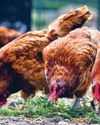
Growing food for Chickens
Mary Larham explores some crops to grow on your holding…
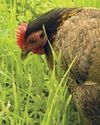
Poultry in the garden – the truth!
Jo-Jane Buxton shares her experiences

The British Waterfowl Association
Which came first, the goose or the egg?

WHY FIT A FAN IN AN INCUBATOR?
Brinsea Products, the Incubation Specialists explain the difference between still air and forced draught
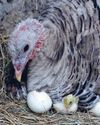
Incubating turkey eggs
Janice Houghton-Wallace looks at broody turkeys and artificial incubation

Chicken nesting box herbs
Diana Clauss owns The Blue Feather Farm, in St Cloud, Florida, home to chickens, ducks, goats, and Anatolian Shepherd dogs.
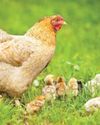
Incubate in January?
Jessica Wombwell says plan the breeding
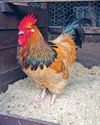
Andy's DIARY
Andy emphases the importance of keeping out damp and wet but allowing ventilation even in cold weather
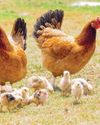
Feeding for Breeding
It may be winter, but as Joanna Palmer, nutritionist for Smallholder Range explains, now’s the time to get your flock in tiptop shape and plan ahead for a successful breeding season next spring.

A chick named Cuckoo raised by a duck!
Chris Hammacott and her husband live on a small croft in the Outer Hebrides, they keep a ‘no kill’ flock or rare and rescue sheep which they use to spin and weave rugs. They also share the 8 acres with hens, ducks, cats and 9 rescue pugs.